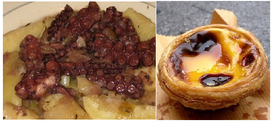PORTUGAL | Socializing | Cultural information
Mentality & Communication
In Portugal, you greet people with two kisses on the cheek, with the exception of two males who will shake hands. In work and business environments, the correct way to greet someone is with a hand-shake.
When you meet someone for the first time, you should address them formally by ‘você’. The same applies to interactions between young people with older people, to show respect. You also address older people by Senhor (Sr.) for men and Senhora (Sra.) or Dona (D.) for women. Between friends you address each other informally by ‘tu’.
Going out to Eat or Drink
Going to cafés is an integral part of Portuguese society. It’s no wonder there are cafés on every street corner. Cafés are meeting places for friends at any time of day to talk or to simply have a cup of coffee and relax. For coffee lovers, you will certainly enjoy our coffee.
It’s common to have breakfast out. A typical breakfast would be toast or bread with butter, cheese or ham, a variety of baked goods and coffee. The typical opening hours for cafés is from 8 a.m. to 8 p.m. The exception would be for café-bars that are open until midnight.
Local Customs
The Patron Saints are celebrated during the month of June.
Santo António (St. Anthony)
Festivities are more apparent and elaborate in Lisbon where the traditional Marchas de Santo António takes place on the night of the 12th of June. This is an allegoric parade organised by the various neighbourhoods in the city. The holiday itself is celebrated on the 13th of June in many towns and cities across Portugal. The festivities last the whole night through with traditional dance and music, food stands with charcoal grilled sardines, caldo verde (typical kale soup) and broa (typical cornmeal bread) and red wine. It’s usual for boyfriends to give their girlfriends a potted basil plant with a small flag containing a popular romantic four-line poem.
Santo António is also known as the ‘santo casamenteiro’ (saint of love). For this reason, every year on the 13th of June, the Lisbon City Hall organises the wedding of various couples of modest origin in the city’s Cathedral, Sé Patriarcal de Lisboa. The newly-weds are called ‘noivos de Santo António’.
SÃO JOÃO (St. John)
Celebrated on the night of the 23rd to the 24th of June in many towns and cities in Portugal, the festivities are more elaborate in Oporto and in Braga. Traditionally, we eat charcoal grilled sardines, we decorate our homes and patios with basil plants, we walk through the city with harmless plastic hammers and large garlic stalks that we “hit” people over the head with and small air balloons are released into the night sky lit by candles.
SÃO Pedro (St. Peter)
Celebrated on the 29th of June, mainly in towns and cities by the seaside, festivities include popular music and dance and sardinhadas (charcoal grilled sardine fests).
Heritage & Nature
Fado is undoubtedly the most well known Portuguese music. Its origins can be traced back to the early 19th Century. Enthusiasts of fado claim that it is influenced not only by traditional music of Portuguese sailors but also by African and Arab music. Fado is characterised by melancholic music and lyrics, strictly linked to the sentiment ‘saudade’, which has no equivalent translation into any other language but implies feelings of melancholy, nostalgia, longing. Another aspect that characterises fado is the use of the Portuguese guitar, a fundamental musical instrument for this style of music.
Fado has two different styles from the cities of Lisbon and Coimbra. Fado from Lisbon is more popular in nature and more well known, whereas fado from Coimbra has a more refined style to it. The most well known world-wide fadista, name by which singers of fado are known as, was Amália Rodrigues. At present time, and with fado’s growing popularity, both nationally and internationally, there are many successful fadistas. To name but a few: Mariza, Ana Moura, Mafalda Arnauth, Katia Guerreira, Mísia, Camané, Carlos do Carmo. For more information about fado, shows and events you can check out www.fado.com.
Typical local recipes

- Stewed Octopus
- Custard tarts (Pastéis de Nata)
